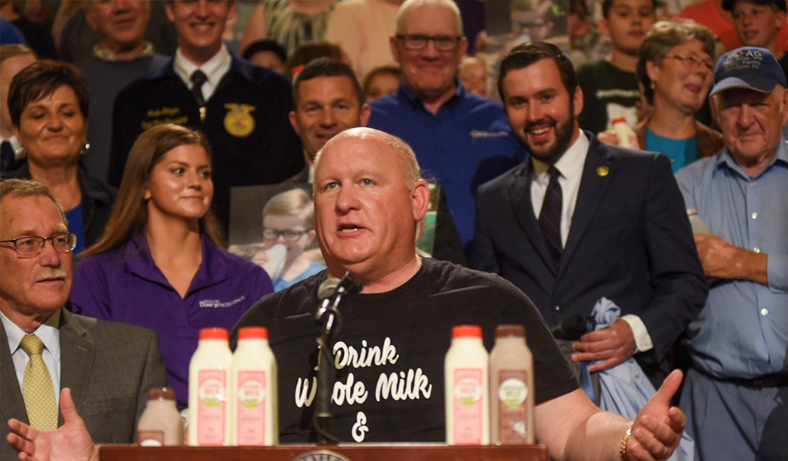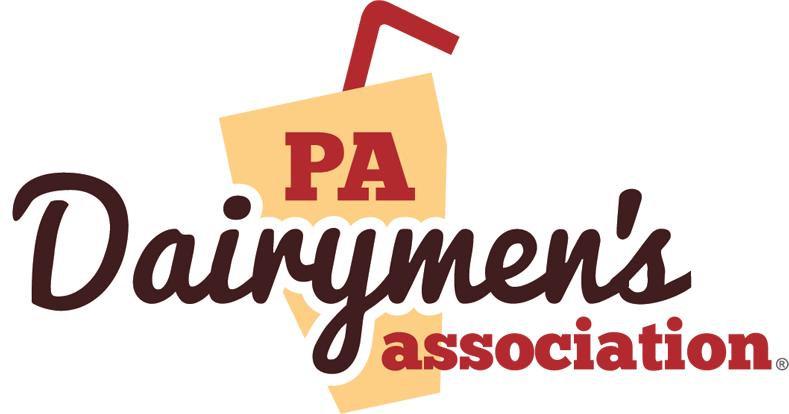
State Capitol “Dairy Day for PA Healthy Kids” highlights nutritional and economic benefits of real milk and dairy products
HARRISBURG, Pa. — Surrounded by schoolchildren and farm families, Pennsylvania dairy leaders called on legislators and policymakers at the State Capitol to urge Congress to pass reforms that would bolster students’ nutritional options by permitting whole milk to be served in schools and to end the mislabeling of non-dairy products as milk. The rally capped “Dairy Day for PA Healthy Kids” and focused on passage of three key measures in Washington:
- S. House Resolution 832, the Whole Milk for Healthy Kids Act, sponsored by U.S. Representative Glenn “GT” Thompson (R-15), that would give students in public schools access to a full range of milk choices including whole milk—both flavored and unflavored. Under current federal regulations, schools can only offer students unflavored skim or 1 percent milk.
- S. House Resolution 1769, the Dairy Pride Act, co-sponsored by U.S. Representative John Joyce, (R-13), that calls for enforcing regulations prohibiting mislabeled milk alternatives.
- The Milk in Lunches for Kids Act (MILK), sponsored by U.S. Senator Pat Toomey (R-PA), that would allow schools to serve whole milk and 2 percent milk. It also requires the U.S. Department of Agriculture (USDA) Secretary to revise regulations and exclude milk fat from the cap on saturated fat in school lunches.
Since 2010, when Congress passed the Healthy, Hunger-Free Kids Act, schools have been permitted only to offer students skim and one percent milk. In a rule change last year, the USDA Secretary allowed schools to seek a waiver to offer one percent chocolate milk in their cafeterias.
“The hard-working dairy farmers of this commonwealth have one goal each day: To provide nutritious, wholesome natural milk that fortifies bodies and pumps billions of dollars and thousands of jobs into Pennsylvania’s economy,” said Dave Smith, executive director of the PA Dairymen’s Association, who spearheaded the advocacy event along with other dairy leaders. “We’re asking Congress and administration officials in Washington and Harrisburg to allow us to offer a full range of power-packed milk products to strengthen the bodies and fuel the minds of students in grades k-12. And, we ask them to end the unfair practice of competitors who label their non-dairy products as milk.”
“Milk is the No. 1 source of nine essential nutrients in the diets of our students, but if they’re not drinking milk, they’re clearly not getting these benefits,” Rep. Thompson said. “Milk consumption has been declining in schools because kids are not happy with the lack of choices. I was excited to rally in Harrisburg today in support of the Whole Milk for Healthy Kids Act and Pennsylvania’s dairy industry. I look forward to the day when school lunchrooms can offer a wider range of milk options so students can choose the kind they love best.”
“Pennsylvania’s dairy farmers work hard every day to support our local economy and produce high-quality, nutritional milk,” noted Rep. Keller. “Washington needs to work as hard as they do to make sure our farmers have the support they need to operate in a fair and transparent marketplace. I’m proud to stand with Congressman Thompson and the tens of thousands of dairy farmers across Pennsylvania to fight for our dairy industry.”
“Every parent knows milk does a body good,” said Senator Toomey. “The decision in 2010 to prohibit whole milk and two percent from being served in schools contributed to a sharp decline in consumption across the country, which means kids are not getting essential nutrients milk provides. This measure fixes that error and permits schools to sell whole and two percent milk once again.”
“As a doctor, it is clear to me that the mislabeling of milk creates a public health issue,” added Congressman Joyce. “Consumers should be able to feel confident that they are getting the proper nutritional value from their dairy products and enforcing federal regulations is necessary for that to occur. In visits to dairy farm after dairy farm, I have heard about the lost revenue that plant-based dairy imitators have taken on our economy and it is incredibly urgent we continue to monitor the subject. Passing the Dairy Pride Act to revive Pennsylvania’s dairy industry is one of my top priorities this term.”
The State House Agriculture and Rural Affairs Committee, chaired by Rep. Martin T. Causer (R-67), has offered two resolutions: HR 402 (Struzzi) supporting the availability of whole milk in schools, and HR 222 (Lawrence) urging Congress and the Food and Drug Administration (FDA) to defend dairy farmers by enforcing a standard of identity for the term “milk.” HR 222 notes that plant-based, so-called milks create confusion in the marketplace and that stricter enforcement by the FDA of the traditional standard definition of “milk” would bring clarity and help protect Pennsylvania’s dairy farmers who have seen a drop in milk consumption since adoption of the new school-nutrition standards.
A diverse coalition attended the rally, holding signs that promoted the health benefits of consuming nutrient- and protein-rich real dairy milk. Smith also highlighted dairy farming’s significant, positive impact in Pennsylvania and the fact that current federal policies threaten those benefits:
- Milk is the official beverage of the Commonwealth of Pennsylvania.
- dairy farms produce 10.6 billion pounds of milk each year.
- One 8-ounce serving of whole milk delivers 9 essential nutrients including 8 grams of protein.
- A glass of milk contains three of the four nutrients the USDA says are under-consumed by most Americans—calcium, vitamin D and potassium.
- According to the Dietary Guidelines for Americans, individuals ages 9 and older should consume three servings of milk, cheese or yogurt each day; those ages 4-8 should consume 2½ cups per day.
- Every one cow supports $24,000 in annual economic revenue in Pa.
- Every 10 cows support one job in the state.
- ’s dairy industry contributes nearly $15 billion annually to the state economy and is the largest sector of the state’s #1 industry, agriculture.
Nutritionist Althea Zanecosky, MS, RD/LDN, said emerging scientific evidence is starting to question the advice of providing only low-fat and skim milk particularly to children.
“These new studies raise the possibility that our current recommendations for low-fat or skim milk in early childhood years may contribute to low vitamin D status and higher body fatness,” noted Zanecosky. “The new pediatric milk studies are surprising and contradict the rationale for current dietary milk recommendations for children; that one level of milk fat is for everyone, a kind of one-size-fits-all solution. If a child prefers the taste and texture of whole milk, especially over the option of no milk, then whole milk is a good choice. The choose low-fat or fat-free dairy foods message is an easy fix, but when applied to kids, it’s not that easy. The science says we can be more flexible.”
Stacey Copenhaver, a dairy farmer and co-owner of Talview Dairy in Lebanon, urged Pa.’s Congressional delegation to push for passage of the Dairy Pride Act and help the buying public better understand their choices.
“Real milk is a protein powerhouse that energizes children and enriches their young minds eager to learn,” said Copenhaver, a mother of three school-aged children. “Unfortunately, for far too long, beverage competitors have been allowed to mislabel their non-dairy alternatives as milk. That practice has to stop. Cows produce real dairy milk, not soybeans or almonds or other imposters. Consumers deserve to know the truth about the products they choose to offer their children and schools should be permitted to serve wholesome, natural, delicious whole milk to kids.”
The coalition, which includes PA Farm Bureau, PA Dairymen’s Association, PA Milk Marketing Board, PA Dairy Princesses and Promotion Program, Center for Dairy Excellence, Professional Dairy Managers of Pennsylvania, PennAg Industries Association, Future Farmers of America (FFA) – PA State Officers, county farmers and dairy coalitions, asks Pennsylvanians to write and call members of the General Assembly and U.S. representatives and senators to press for passage of HR 832, HR 1769 and Sen. Toomey’s legislation. They encourage all Pennsylvanians to #ChoosePADairy when shopping for milk. Consumers can look for the plant code “42” stamped on milk containers and the PA Preferred® label.
###
